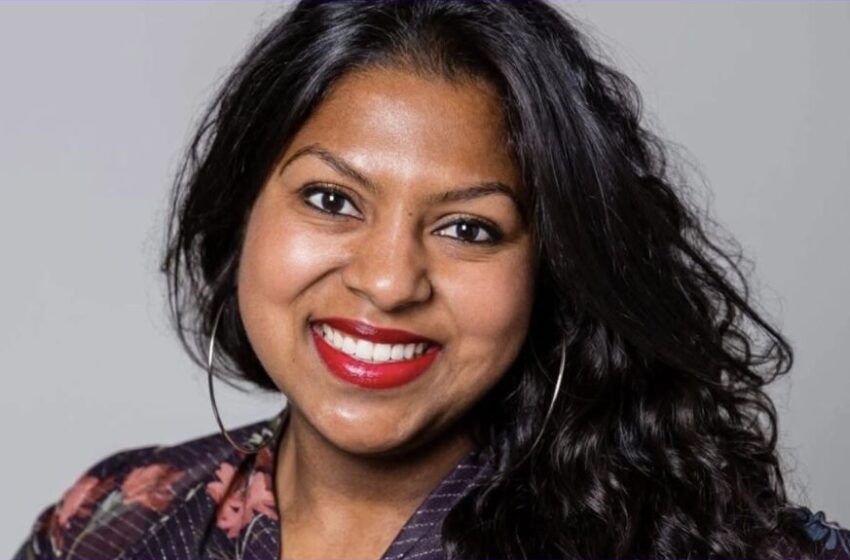Hasna Maznavi, founder of first all women’s mosque in the US, passes

In 2014, Maznavi co-founded the first Women’s Mosque of America, led by women, for women and only open to women
By Arun Kumar
M. Hasna Maznavi, one of the co-founders of the Women’s Mosque of America in Los Angeles, led by women, for women and only open to women died April 2 from complications related to Type 1 diabetes. She was 39.
Maznavi was also a comedy writer, director and performer whose work focused on the authentic portrayal of Islam, Muslims and other underrepresented communities in the media.
READ: Five Indian Americans among City & State’s 2025 Queens Power 100 (March 27th, 2025)
In 2014, she founded the first women-led Muslim house of worship in the U.S. when the Women’s Mosque of America, housed at the Pico Union Project in downtown Los Angeles, opened its doors.
Reading the Quran in English for the first time was a life-changing experience for Maznavi, then 29, told NBC News in 2015. “Many of the things I believed about Islam and about my role as a Muslim were actually not in the Quran,” she said. “What I found in it was actually a merciful, loving god who celebrated the equality of both genders.”
A mutual friend connected Maznavi, who was of Sri Lankan descent, with Sana Muttalib, a 31-year-old Indian American lawyer and kindred spirit. The two decided to start the country’s first women’s-only mosque.
“Literally there have been times where I’ve gone to mosque and they will have a 10-year-old boy who has memorized the entire Quran lead the congregation in prayer,” said Maznavi. “And how many times have [you] gone to the mosque and some random uncle gets up and starts speaking? If he can do it, there’s no reason why we can’t.”
Maznavi grew up in a mosque in Southern California where women and men originally prayed in the same hall, and where women had equal access to the entire mosque.
But as the mosque grew and obtained funds to restructure, the design changed so that men prayed on the bottom floor and women prayed on the top floor. In essence, Maznavi says, women were cut off from interacting with the main congregation.
“The architectural [divide] trickled down into the culture of the mosque itself,” she recalled, “changing the mosque into a less welcoming environment.”
For Maznavi, starting a women’s only mosque was the fulfillment of a childhood dream. It provided her an opportunity to advocate for women’s rights within the faith. “With this opportunity, all these women are realizing that they have so much more potential than they’ve been giving themselves credit for this whole time,” Maznavi said back in 2015.
Maznavi told AirTalk’s Larry Mantle in 2015 that she created the mosque to “provide a platform for female Muslim scholars and female professionals and authorities, religious authorities, to be heard by the masses,” according to LAist.
The mosque, she added, was a safe space for women to grow. “This mosque really starts as a childhood dream I had of building a mosque before I die, something that would give back after I was gone,” she said.
For her work in creating a safe space for empowering women, she was recognized as one of CNN’s 25 influential American Muslims in 2018.
Najeeba Syeed, El-Hibri endowed professor of interfaith studies and executive director of Interfaith at Augsburg University, called the mosque “beyond what many of us could have imagined.”
Syeed said Mazvani’s death has been felt across the nation. “She invited women to share an intergenerational experience of learning, activism, study and fellowship. I’ve received texts from women across the country mourning her passing and remembering how much she built community for all of us,” Syeed told LAist.
“We’re so very sad to lose her and praying God blesses her for all her amazing efforts in this lifetime and her life’s work that brought so many Muslim women together.”
Faisal Buharie, a community leader based in Orange County, said Maznavi helped elevate “Sri Lankan Muslim representation in American society through her work in entertainment and civic engagement.”
Buharie called Maznavi “a person of extraordinary compassion who put others’ needs before own. The memory of her kindness and love will continue to live in our hearts.”
In a statement to LAist, the Maznavi family said: “Hasna’s legacy is one of creativity, compassion, and unwavering commitment to fostering unity across diverse communities. Her work will continue to inspire and uplift for generations to come. She will be profoundly missed by her family, friends, and all who knew her.”
Janaza (funeral) prayers for Maznavi were held at the Islamic Society of Orange County in Garden Grove on April 5, followed by the burial at the Artesia Cemetery in Cerritos.

